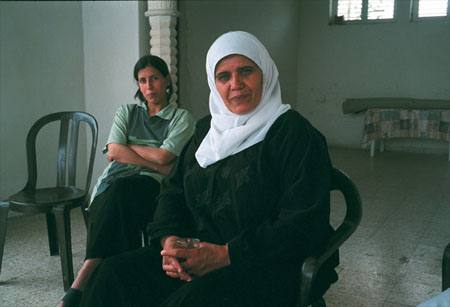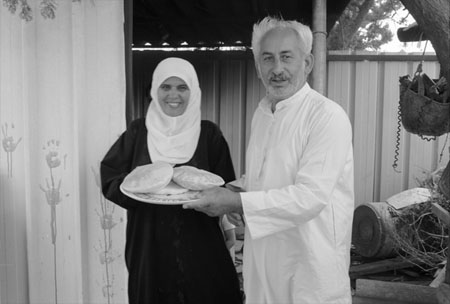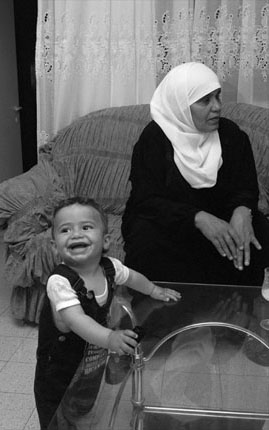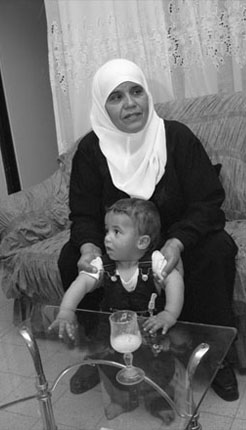
Umm Fawaz, Ramleh, April 1999. Photo: Leena Saraste
|
 Umm Fawaz, Ramleh, April 1999. Photo: Leena Saraste |
| Umm Fawaz, Ramleh, April 19:
|
 Umm Fawaz, Ramleh, April 1999. Photo: Leena Saraste |
|
The first subject Salah chooses for us is his wife's mother, Umm Fawwaz, who lives in Ramleh. We arrive at a large yard with building materials piled up, and several housing units giving off it. The largest of these is a sewing factory. On the way Salah tells us that Umm Fawwaz is a successful businesswoman, as well as bringing up a large batch of children. The home is full of daughters and grandchildren. I ask Umm Fawwaz if I can record with her? And can it be somewhere quiet?
In retrospect it amazes me how many recordings were carried out like this one, without prior appointments, or even full explanations of purpose. Of course it's like this only because we arrive accompanied by someone familiar to the chosen speaker. This is also why it would be useless to ask Salah to take us to meet someone he doesn't already know. It's not a 'scientific' way of choosing speakers but it's probably the only possible one when working with an oppressed community, without the time to stop and get to know people gradually. Umm Fawwaz begins by talking about her family background, how marriage rules for daughters were closely linked to social status, and how she has compromised between 'tradition' and 'modernity' in arranging her own daughters' marriages. She tells about buying the land and building the house, and how the Israeli authorities accuse them of doing these illegally. It's waqf land and they have a bill of sale, but the whole quarter is condemned to demolition eventually. She doesn't talk about the sewing factory, perhaps so as not to annoy her husband, who seems upset by not being chosen to speak to the recorder. It's hard to gauge how much selecting for women disturbs domestic settings. Annoyance might be concealed until after the researcher has left. Or it might simply be categorized as a foreign mania, hardly worth discussing. Umm Fawaz speaks: |
bedouin. I was born on November 26, 1946. When we were thrown out I was two years old. We lived near Gaza. When the Jews took the place we were living in, our homes, they named it Kibbutz B'ir. Our family does not allow our daughters to marry outside [the family]. In the beginning, they only married girls inside the family. A man could take three, four - it didn't matter. The important thing was to keep the girls of the family, and not to leave any girls unmarried. I was educated in an Arab school - [Where?] in Gaza. [A school for refugees?] Yes, refugees. When we were in school - my father was married to three women, he fathered eleven daughters and eleven sons from the three of them. Me, because they didn't give (girls) to strangers, when I reached sixteen, my father made me marry the son of the uncle of his father. He was in the same place (as us). We married here in 1963. In Ramleh, in this house. (How did you come here?) The Jews said to us, 'If you want to go back to your land, go'. So we came, but not the same house, to another house in the middle of the town, in Ramleh. And we went on living here. They said those who want to go back, go back. Because we didn't go right to the inside of Gaza, we stayed on the frontier. I married and I gave birth to twelve children, six girls and six boys"
Salah returns at 3pm, after having his car fixed. He drives us back to Lydd. I ask him if he has a job? He says 'No', and points to his throat, where his open shirt reveals the beginning of a downwards-running scar. He tells us that he studied dentistry in Bulgaria but has never been able to practice because of poor health. Part of his lung is plastic. As a hobby he mends computers. I feel embarrassed to ask him how he manages - wife, two children, home, car - questions like this are asked for means' tests by insurance agents and social workers. Colloquial Arabic certainly has an indirect or humorous way of eliciting the same information but I don't know it.
|


Umm Fawaz and grandson, Ramleh, April 1999. Photo: Leena Saraste More photos |
[April 18] [Najla `M`harb`] Copyright©2005 |
|